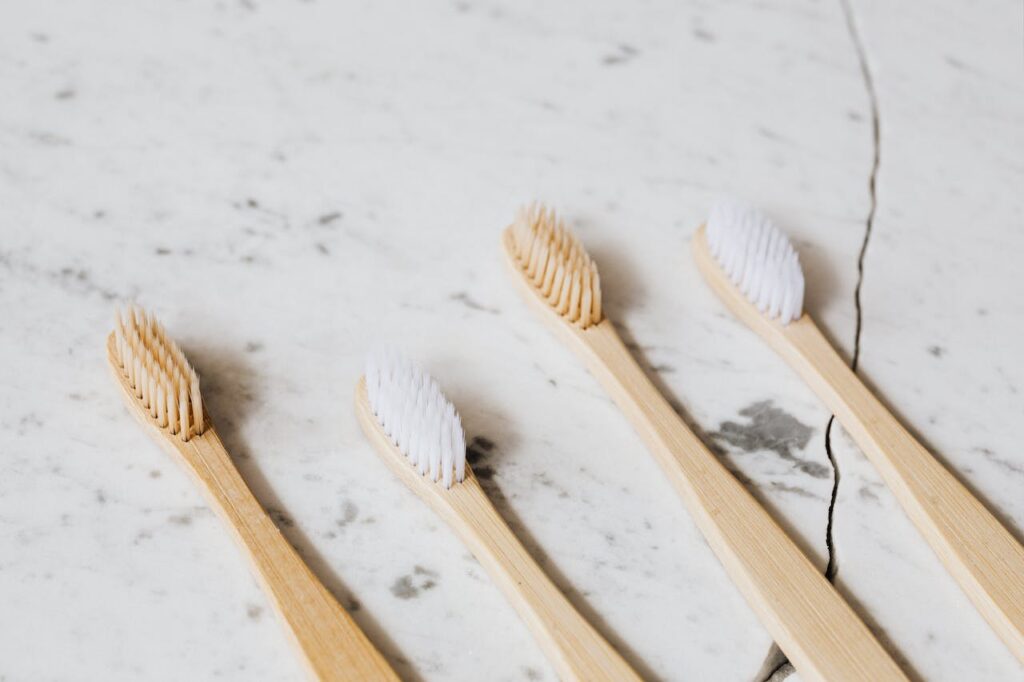Tip #3: Flossing is Important
Flossing plays a crucial role in your oral hygiene routine, especially with braces. Braces can trap food and plaque not just between your teeth, but also around the brackets and wires. This makes flossing more important than ever.
- Why Flossing Matters: Flossing removes plaque and food particles from between your teeth and under the gum line, areas your toothbrush can’t reach. This helps prevent gum disease and tooth decay, which are risks increased by wearing braces.
- How to Floss with Braces: Using floss with braces can be tricky, but it’s not impossible. Floss threaders are a lifesaver here. They allow you to thread the floss behind the wire easily. Gently move the floss up and down between each set of teeth, and be careful not to snap the floss on the wires or brackets.
- Best Times to Floss: Ideally, floss every night before bed. This ensures that your teeth are clean from the day’s food particles and plaque buildup.
Tip #4: Use Fluoride Toothpaste and Mouthwash
Fluoride is your ally in the fight against cavities, especially when you have braces. It helps repair minor tooth decay before it becomes a big problem.
- The Role of Fluoride Toothpaste: Fluoride toothpaste strengthens the tooth enamel, making it more resistant to decay. It’s particularly beneficial for those with braces as it can help combat the plaque that tends to accumulate around brackets.
- Incorporating Mouthwash: After brushing and flossing, rinse with a fluoride mouthwash. This extra step can reach places that might be missed by brushing and flossing alone, offering another layer of protection.
- Consistency is Key: Use fluoride toothpaste every time you brush and mouthwash at least once a day, preferably at night after brushing and flossing.
Together, these steps will help maintain the health of your teeth throughout your orthodontic treatment, ensuring that when your braces come off, your smile is as healthy as it is beautiful.
Tip #5: Watch What You Eat
When you have braces, paying attention to what you eat is more important than ever. Certain foods can damage your braces or increase the risk of tooth decay.
- Avoid Hard and Sticky Foods: Crunchy snacks like popcorn, nuts, and hard candies can break or damage the wires and brackets of your braces. Sticky foods like caramel or chewing gum can get stuck and are difficult to remove, leading to plaque buildup.
- Cut Down on Sugary Foods: Sugary foods can lead to tooth decay and gum disease, especially with braces. The sugar can get trapped around your braces, creating a feeding ground for harmful bacteria.
- Eat Teeth-Friendly Foods: Focus on eating softer foods that are easier on your braces. Fruits, vegetables, and soft proteins are great choices. If you’re eating something firmer or crunchier, cut it into smaller pieces to make it easier to chew.
Tip #6: Keep Up with Dental Checkups
Regular dental checkups are vital when you have braces. They help keep your teeth healthy throughout your treatment.
- Routine Cleanings and Exams: Even with meticulous brushing and flossing, plaque and tartar can build up in hard-to-reach areas. Regular dental cleanings help keep your teeth and gums healthy. During checkups, your dentist can spot potential issues early on.
- Professional Guidance: Your dentist can provide advice on how to care for your teeth with braces, including tips on effective brushing and flossing techniques.
- Frequency of Visits: Stick to your dentist’s recommended schedule for checkups and cleanings. Typically, this would be every six months, but some people might need more frequent visits.
By watching what you eat and keeping up with regular dental visits, you can ensure that your orthodontic treatment will leave you with a healthy, beautiful smile.
Tip #7: Be Careful with Habits
Your daily habits can have a big impact on the effectiveness of your braces and the health of your teeth. Being mindful of certain behaviors can prevent damage to your braces and ensure your treatment goes smoothly.
- Avoid Hard and Chewy Items: Biting down on hard items like pens, pencils, ice, or hard candies can bend or break the brackets and wires of your braces. Similarly, chewing on sticky foods can dislodge your braces.
- Nail Biting: This common habit can also cause damage to your braces. Try to find alternatives to keep your hands busy, like squeezing a stress ball or playing with a fidget spinner.
Tip #8: Protect Your Braces and Teeth
Especially for those active in sports, protecting your braces and teeth is essential. An unexpected impact can cause damage to your braces or injury to your mouth.
- Use a Mouthguard: A mouthguard is a must for sports and physical activities. It cushions your teeth and braces, protecting them from potential impacts. There are special mouthguards designed for use with braces that provide extra space and comfort.
- Regular Orthodontic Checkups: Besides your regular dentist visits, keeping up with your orthodontic appointments is essential. Your orthodontist can identify and address any issues with your braces, such as loose brackets or poking wires, which can become problematic if left unchecked.
By being careful with your habits and protecting your braces, you’re not just taking care of your current treatment but also investing in a healthier smile for your future.



